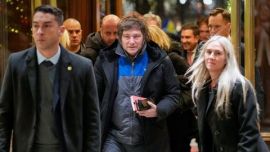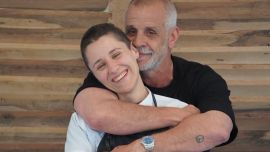In the year marking the 25th anniversary of the AMIA Jewish community centre bombing, which killed 85 people and left hundreds injured, a federal court on Thursday finally handed down convictions and sentences.
A court in Buenos Aires found that the judge, prosecutors and head of the Argentina’s secret services – the individuals responsible for investigating Argentina’s deadliest terrorist attack – had interfered with the inquiry, diverting the investigation away from the truth.
Former president Carlos Menem, however, was acquitted of all charges against him by judges Jorge Gorini, Karina Perilli and Néstor Costabel, as was Rubén Beraja, who headed the Delegation of Argentine Jewish Associations (DAIA) Jewish umbrella organisation during the 1990s.
Former police inspector Jorge “Fino” Palacios – a close ally of President Mauricio Macri – was also exonerated.
Former federal judge Juan José Galeano, 60, was handed down a six-year conviction by the court, which will not be enforced until the sentence is confirmed by a higher tribunal. That could take several years.
Former State Intelligence Secretariat (SIDE) intelligence head Hugo Anzorreguy was handed a prison sentence of 54 months, but he is likely to be granted house arrest due to his advanced age and his health problems.
Carlos Telleldín, a used car dealer who sold the van that contained the bomb used to attack the Argentine Israelite Mutual Association (AMIA) centre, was sentenced to 42 months in jail.
Telleldín was tried for delivering false testimony, intending to incriminate a group of Buenos Aires police officers in the attack. In exchange, he and his wife, Ana María Boragni, received US$400,000, paid with funds from SIDE, Argentina’s former secret service.
He will face a new trial for selling the van used in the attack in May. Some weeks ago, playing down the importance of the cover-up trial, Justice Minister Germán Garavano argued the trial against Telleldín is the most effective way to learn who truly staged the attack.
Pressure groups who have campaigned for justice for the victims of the attack were present in court for sentencing.
“The trial proved that what [justice campaign group] Memoria Activa said all along was right,” said Adriana Reisfeld, one of the organisation leaders after the verdict was delivered. Her sister, Noemí, was killed in the 1994 attack.
In 1999, Reisfeld’s organisation joined with the Centre for Legal and Social Studies (CELS) to file a complaint before the Inter-American Commission on Human Rights (IACHR), which led to a settlement with the Argentine government in 2004. Then-president Néstor Kirchner acknowledged that the national Judiciary and Executive had sought to cover up the perpetrators of the attack and agreed to promote a new and unbiased investigation.
One of the results of that agreement was the creation of a special Attorney-General unit to investigate the AMIA attack (UFI-AMIA), which was led by Alberto Nisman until his mysterious death in 2015.
Roberto Salum, who led the UFI-AMIA team in the coverup trial, praised the importance of the verdict but told the Times he would have to wait until the grounds for the ruling are unveiled on May 3 to understand the acquittals and the penalties granted.
POLITICAL DISPUTE
Prosecutors Eamon Müllen and José Barbaccia were handed a two-year suspended sentence by the court. Though they will not go to jail, their conviction deals a blow to Justice Minister Garavano, who ordered the government’s plaintiffs to request the court drop the charges against the former prosecutors.
Garavano’s decision prompted a row within the ruling Cambiemos (Let’s Change) coalition. Mario Cimadevilla (UCR), who previously chaired the Justice Ministry’s AMIA Unit, accused him of beginning a new chapter of complicity with the cover-up of the deadly attack. Elisa Carrió, the leader of the Civic Coalition, asked Congress to impeach the minister.
“Garavano should resign from his post if he has any sense of shame,” said lawyer Rodrigo Borda, who represented Memoria Activa in the trial.
Cimadevilla, for his part, took to Twitter to reignite the controversy.
“The verdict for the AMIA cover-up was delivered today [Thursday]. Those whom I was ordered to ask for their acquittals, due to their friendship with the Justice Minister, were convicted,” he wrote.
APPEALS, SENTENCING
Federal Oral Court No. 2 considered the cover-up of the AMIA attack to be a serious human rights violation. However, the penalties handed down were less severe than expected considering the gravity of the crimes, explained Borda.
“We will appeal,” he declared. The list of appeals will likely include the findings against Menem, 88 and a sitting senator for La Rioja, and Beraja, 79.
The latter’s acquittal was celebrated by AMIA and DAIA in a joint statement. Beraja, a close ally of the former president, and his Interior Minister Carlos Corach were accused of having approved the payment made to Telleldín in order for him to implicate the police officers.
“Despite the accusations heard, the judicial proceedings have not provided factual evidence supporting that conspiracy theory, and in fact have not produced conclusive evidence to support either that Telleldín was paid to lie or, far less, that the former police officers were knowingly involved in the case in the knowledge of their innocence,” AMIA and DAIA said, rebutting the position taken by the other plaintiffs and the prosecutors.
Meanwhile, CELS welcomed the judicial decision, which confirmed the responsibility of state agents in the scheme.
“The main consequence of the cover-up is that after 25 years, the families of the 85 killed in the attack and the whole of Argentine society still do not know the truth about what happened,” the human rights organisation said in a statement.
STILL TO COME TO LIGHT
The investigation into the attack is still in the hands of Federal Judge Rodolfo Canicoba Corral, who has previously accused Iran of being behind the bombing and ordered the arrest of several officials. Interpol currently has four red alerts in place in relation to the AMIA attack: three against Iranian citizens and one against a citizen of Lebanon.
In 2013, the Cristina Fernández de Kirchner administration promoted its controversial Memorandum of Understanding (MOU) with Iran, which it said was aimed at unlocking the probe. A year later, an appeals court ruled the agreement was unconstitutional and in 2015, only four days before being found dead, Nisman accused the former president of seeking to cover up the role of Iranian officials in the bombing via the MOU.
Although Nisman’s complaint was originally dismissed, it was reopened soon after Macri took office. Fernández de Kirchner is expected to stand trial for the MOU with Iran later this year.


























Comments